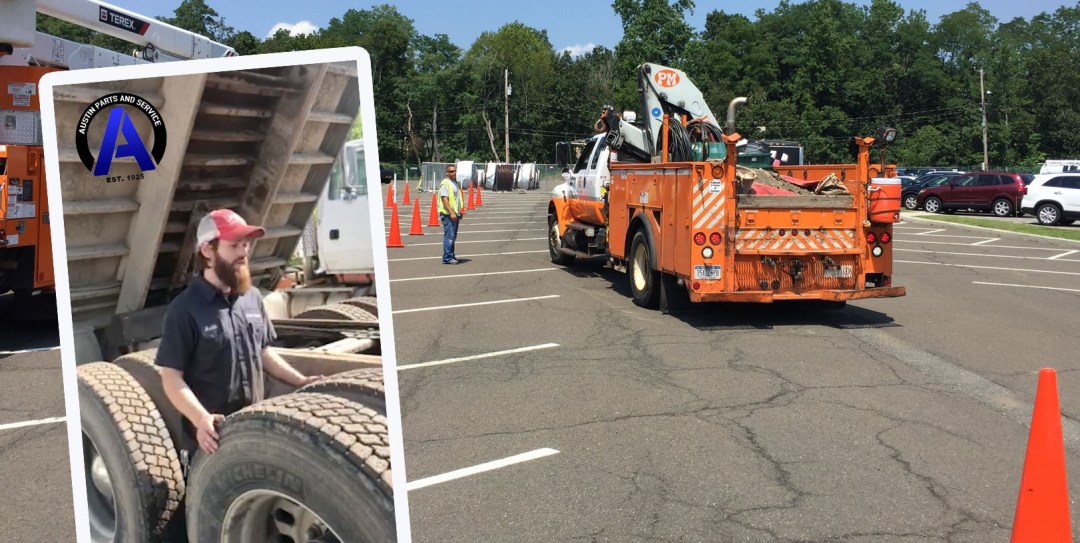Brake Safety Week is a critical initiative in the world of road safety.
The CVSA’s annual Brake Safety Week is an essential part of ensuring safe roads for everyone.
The importance of Brake Safety Week cannot be overstated. It plays an instrumental role in maintaining safe roads for all users.
Meticulous inspections and rigorous maintenance protocols during this week ensure that commercial vehicles are operating with optimal braking systems, making our roads safer for everyone involved.
Table of Contents:
- The Importance of Brake Safety Week
- What Unfolds During Brake Safety Week?
- Key Focus Areas During Inspections
- Unpacking the Consequences of Brake-Related Violations on Carrier Ratings
- Education: A Key Component of Brake Safety Week
- The Success Story of Brake Safety Week
- Looking Forward – CVSA’s Brake Safety Week in August 2023
- Conclusion
- Explore Corporate Driving Programs to Minimize Vehicle Crashes
The Importance of Brake Safety Week
Brake Safety Week, an annual event hosted by the Commercial Vehicle Safety Alliance (CVSA), is a pivotal period that focuses on promoting public safety. It primarily addresses brake-related violations in commercial motor vehicles.
This week-long initiative zeroes in on brake lining and pad violations, which are among the top 20 vehicle violations. These issues can lead to severe accidents if left unattended and have significant implications for a motor carrier’s safety rating.
Poorly maintained or inadequate brake systems pose grave risks as they considerably increase stopping distance for large trucks. This could potentially result in highway crashes caused by faulty braking systems during this enforcement initiative called Brake Safety Week.
View this post on Instagram
Proactive Maintenance: A Key Aspect of Safe Driving
A critical aspect emphasized during this week involves encouraging proactive vehicle maintenance amongst carriers while reminding drivers about their responsibility towards ensuring safe commercial motor vehicle operation. The goal isn’t just identifying faults but also rectifying them promptly.
Educating Stakeholders About Proper Braking Systems
- Raising Awareness: The CVSA uses this opportunity not only to raise awareness about proper inspection procedures but also educate everyone involved with commercial vehicles regarding the importance of maintaining properly functioning brake systems.
- Safety Measures: Tackling these issues head-on ensures safer roads overall, contributing significantly to public safety measures.
- Fostering Responsibility: In essence, it fosters a sense of responsibility within all stakeholders – from mechanics and owner-operators to drivers themselves – underlining how each one plays an integral role in preventing road mishaps due to faulty brakes.
What Unfolds During Brake Safety Week?
The Commercial Vehicle Safety Alliance (CVSA) designates an entire week each year dedicated to brake safety. The primary focus during this period is the rigorous inspection of commercial motor vehicles and the immediate removal from service of those with brake-related out-of-service violations.
A Closer Look at Inspection Procedures
Inspection procedures carried out during Brake Safety Week involve a thorough examination of various aspects of the vehicle’s braking system. One critical aspect inspectors look into is whether there are any missing or non-functioning parts in the spring brake housing section, as well as ensuring consistency in slack adjuster lengths across axles – both vital for proper brake adjustment.
Beyond visual checks, audibility plays a crucial role too. Inspectors listen carefully for potential air leaks around key components and lines within the parking brake portion, which could indicate problems needing attention. In addition, they measure levels of air pressure along with pushrod travel distances – further steps towards comprehensive inspections.
Navigating Through Violation Removal Process
In cases where commercial motor vehicles inspected yield evidence pointing towards any form of violation related to brakes – be it poor maintenance leading to worn-out pads or improper adjustments causing functional inconsistencies – CVSA takes stringent action by immediately pulling them off roads. This approach during Brake Safety Week serves as more than just an enforcement initiative; it stands as a testamentary reminder about the significance of maintaining properly functioning breakaway systems at all times while simultaneously encouraging proactive vehicle maintenance habits among drivers and operators alike.
Key Focus Areas During Inspections
The inspection process during Brake Safety Week is a comprehensive exercise, focusing on several key areas to ensure the safe operation of commercial motor vehicles. One of these focal points involves examining brake linings and pads.
1. Examination of Brake Linings and Pads
A critical part of inspections during this year’s Brake Safety Week includes scrutinizing brake linings and pads for signs that could compromise braking capacity. Excessive wear or contamination by oil, grease, or other substances can lead to poorly maintained brake systems with decreased effectiveness in friction material.
2. Consistency Check for Air Chambers Size
Beyond inspecting components like linings and pads, inspectors also assess air chambers on each axle for size consistency as an integral part of proper brake maintenance procedures during this enforcement initiative led by the Commercial Vehicle Safety Alliance (CVSA). Any discrepancies might indicate issues with the spring brake housing section, affecting stopping distance significantly.
3. Verification Of Warning Devices & Tractor Protection Systems
Mandatory warning devices such as parking brakes are thoroughly inspected too; their functionality forms a crucial component contributing towards public safety measures implemented through CVSA’s initiatives. The operability of the tractor protection system is also verified – it prevents air loss from the truck if there’s any problem with trailer brakes, thus avoiding potential road accidents caused by faulty braking systems.
4. Ensuring Operability Of Trailer Breakaway Systems
Last but not least, ensuring the operability of trailer breakaway systems, which engage automatically when trailers disconnect while driving, forms another critical focus area. These checks help prevent highway crashes caused by improperly functioning brake systems, leading to safer roads.
Unpacking the Consequences of Brake-Related Violations on Carrier Ratings
The FMCSA’s safety ratings have immense influence in the motor vehicle industry, making them a critical factor for carriers. These ratings can be greatly affected by brake-related violations discovered during roadside inspections.
If a carrier’s vehicles are found to have poorly maintained brake systems or improper brake adjustment, it directly and negatively impacts their FMCSA rating.
Financial Implications for Carriers
A tarnished safety record resulting from these violations brings about financial repercussions. Insurance providers may increase premiums, considering carriers as high-risk clients, making proper brake maintenance an economic concern as well.
Furthermore, poor safety records could lead to the loss of business contracts. Many companies prefer to partner with transporters who prioritize road safety and maintain their vehicles, including braking capacity, in top-notch condition.
Harming Reputation Among Stakeholders
Beyond the monetary consequences, such infractions also risk damaging a carrier’s standing within its network, which includes shippers, brokers, and freight forwarders, among others. These stakeholders highly value safe commercial motor vehicle operation.
Brake inspections, therefore, become more than just compliance checks; they reflect a carrier’s commitment to public safety.
- Maintaining properly functioning brake systems is not optional but essential at all times.
- Poorly maintained brakes increase stopping distance, risking highway crashes caused by faulty braking systems.
- Properly adjusted brakes ensure maximum effectiveness when needed most, reducing the chances of breakaway system failures.
This underscores why every player involved in commercial transportation needs to understand the crucial importance of maintaining well-functioning brakes.
Education: A Key Component of Brake Safety Week
The annual Brake Safety Week, spearheaded by the Commercial Vehicle Safety Alliance (CVSA), emphasizes education as a critical element. This initiative seeks to enlighten drivers, mechanics, and owner-operators about proper brake inspection protocols and maintenance practices.
Educational Tools for Ensuring Safe Braking Capacity
Participants receive comprehensive educational materials during Brake Safety Week. These include webinars focusing on safe commercial motor vehicle operation techniques and brochures detailing common issues like poorly maintained brake systems or improper adjustment procedures.
- Audible air leaks around braking components – a sign of potential problems.
- Inconsistencies in slack adjusters length which can lead to faulty brakes performance.
- Detecting missing or non-functioning parts crucial for stopping distance efficiency.
Promoting Proactive Maintenance Practices Through Education
Brake Safety Week plays a crucial role in promoting proactive maintenance practices through education. By providing valuable information and resources, it encourages carriers and drivers to prioritize regular brake inspections and maintenance.
During the week, participants learn about the importance of conducting thorough brake inspections, identifying potential issues, and taking appropriate actions to ensure safe braking capacity. This knowledge empowers them to address problems promptly and prevent accidents caused by brake failures.
Impact on Carrier Ratings
Brake Safety Week also has a direct impact on carrier ratings. The results of brake inspections conducted during the event are recorded and can affect a carrier’s safety rating. Carriers with a high number of brake violations may face penalties, including fines and increased scrutiny from regulatory authorities.
By participating in Brake Safety Week and prioritizing brake safety, carriers can demonstrate their commitment to maintaining safe vehicles and protecting the well-being of their drivers and the public. This can lead to improved carrier ratings, increased trust from customers, and enhanced reputation within the industry.
In conclusion, Brake Safety Week serves as
Brake Safety Week, led by the CVSA, plays a pivotal role in road safety through education on brake inspections and maintenance. It not only helps prevent accidents but also impacts carrier ratings, with proactive participants enjoying improved trust and reputation.
The Success Story of Brake Safety Week
This enforcement initiative’s effectiveness is evident through decreased brake-related violations and fewer highway crashes caused by faulty braking systems on commercial motor vehicles.
In 2023 alone, during an intensive one-day brake safety inspection operation, inspectors conducted roadside inspections on over 34,000 commercial motor vehicles across North America. The results were encouraging; only 13.5% of these inspected vehicles had critical vehicle inspection item violations that led to out-of-service orders – a clear improvement from previous years.
A Decline in Brake-Related Violations
The main objective of CVSA’s annual Brake Safety Week is curbing brake-related violations which are detrimental to public safety. Data from past events shows promising trends with steady decreases observed year after year. In their report for the year 2018, it was noted that almost half of all out-of-service conditions were due to brake adjustment issues; however, this number saw considerable reduction in subsequent campaigns thanks largely to this proactive event.
Cultivating Safer Roads
This positive change isn’t confined within statistical reports but reflects visibly on our roads as well. The program identifies and addresses poorly maintained or improperly functioning brake systems before they can lead to catastrophic incidents. This concerted effort contributes significantly towards creating safer driving environments not just for operators handling large trucks, but also for other road users sharing highways with them.
Looking Forward – CVSA’s Brake Safety Week in August 2023
What To Anticipate?
In an effort to promote public safety, inspectors will conduct rigorous checks on various components such as linings/pads, hoses/tubing, and rotors/drums throughout Brake Safety Week. Special attention will be given to ensuring properly functioning parking brakes.
- A crucial element that often results in numerous citations during these examinations involves tractor protection systems, which prevent air loss in the event of a breakaway situation involving the trailer.
The Significance Of Being Prepared
To avoid being sidelined due to brake-related issues during this enforcement initiative, fleets should encourage proactive vehicle maintenance among drivers well ahead of time.
Conclusion
Brake Safety Week is more than just an annual event. It’s a life-saving initiative that promotes road safety by focusing on the critical role of brake systems in commercial vehicles.
From rigorous inspections to education efforts, this week-long endeavor ensures our highways are safer for all users.
The stringent inspection procedures target every component of braking systems, from linings and pads to air chambers and warning devices.
Any vehicle found with out-of-service violations gets sidelined until they’re rectified. This strict approach contributes significantly towards maintaining safe roads.
A key aspect of Brake Safety Week is its focus on educating drivers, mechanics, owner-operators about proper brake maintenance and operation. Knowledge truly is power when it comes to preventing accidents caused by faulty brakes!
The impact of these efforts? Safer roads, fewer accidents due to brake failures, improved carrier ratings – a win-win situation for everyone involved!
If you want to contribute towards making our roads safer or if you’re simply interested in learning more about driving safety measures like Brake Safety Week, DriveTeam, with its performance-based driving training programs can help equip you with the knowledge and skills needed! Let’s join hands in promoting road safety today!
Explore Corporate Driving Programs to Minimize Vehicle Crashes
Please fill out the form below
More From Our Blog
Turning Tragedy into Action: Kelly’s Crusade for Safer Roads
Every parent of a teen driver understands the anxiety that accompanies watching their child drive away. The open road, while a symbol of freedom, is also fraught with potential dangers that can lead to a parent's worst nightmare. For a couple in Northeast Ohio, this...
Safe Driver Week 2024: Top 10 Dangerous Driving Behaviors to Watch For
Operation Safe Driver Week 2024 Safe Driver Week kicks off on Monday, highlighting the critical importance of identifying and avoiding hazardous driving behaviors. To keep our roads safe, let's dive into the top 10 risky driving habits that threaten the well-being of...
Understanding and Mitigating Our Risk: A Call to Safer Driving
In July 2023, the United States witnessed over 500,000 motor vehicle crashes. The primary causes of these crashes, injuries, and fatalities can be traced back to a few critical factors for safer driving. Distracted Driving: This remains a significant cause of...



